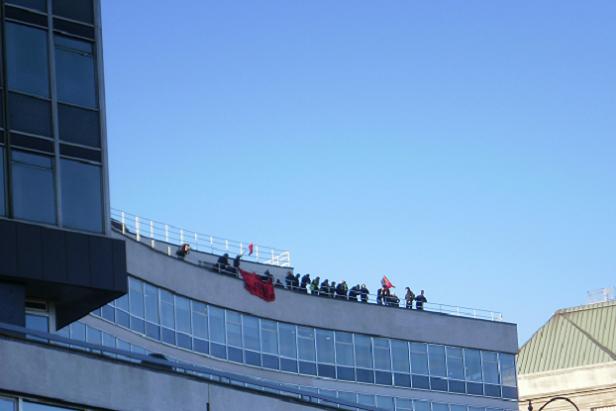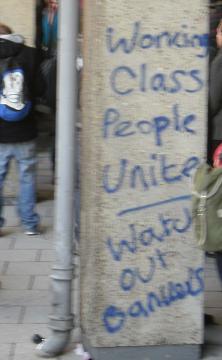Remember, remember the tenth of November
Ceasefire Bites, New in Ceasefire, Politics - Posted on Tuesday, November 16, 2010 0:00 - 1 Comment
 By Malte Ringer
By Malte Ringer
Last Wednesday, tens of thousands of students marched through central London to protest against the Browne Review. Tuition fees are to be almost tripling to £9,000 p.a., teaching funding will be slashed by 80% and the Education Maintenance Allowance (EMA) is to be scrapped, among other deep cuts. The National Union of Students had finally decided to act. And so I joined hundreds of other students from Nottingham on a trip to London.
As we marched past Westminster Abbey towards our destination one could not get lost. Great throngs of students from all over the country were converging on the rallying point, and soon we fraternised with others – from Leeds, Huddersfield, Exeter, Aberystwyth and a myriad other places. There were not just Russell Group students, but also many in further education, sixth-formers, teachers, lecturers, and labour activists – no ‘very middle class protest’ this, pace the Daily Mail.
What was striking at once was the joyful atmosphere, helped no doubt by the good weather. Slogans and placards ranged from the defiant (‘Ex-poly and proud of it’) to the astonishingly frank (‘F**k fees’). But beside these there was an extraordinary creativity and playfulness, from ‘I could have made a better sign if I had enough money to go to university’ to the surreal pinnacle of ‘Is this the queue for Justin Bieber tickets?’.
Many were elaborately dressed up, giving a carnivalesque feel to the whole event, a euphoric celebration of protest: it felt good to finally go out and do something. There were Labour and LibDem students, too, and one of the latter group explained to me that in his party ‘only Clegg and about five other people’ supported tuition fees.
Around 50,000 people had shown up, the organisers claimed as we gathered to listen to speeches. When the rally was over I wandered aimlessly for a while, before deciding on a decidedly bourgeois way to kill a few hours: I’d go to Tate Britain. Bumping into some Nottingham academics I knew on my way there – were they surprised to see me, a student little noted as a radical firebrand? –, I walked past 30 Millbank, the London headquarters of the Conservative Party where we had gathered peacefully before the rally. I looked twice and realised that there were flag-waving protesters on the roof.
In the courtyard there were perhaps a thousand people shouting slogans and waving placards. As I later learnt, protesters had been allowed to simply walk inside the building, occupying it and causing Tories including Baroness Warsi to barricade themselves in their offices. The space outside was packed, people like me jostling for places to get a better view even on the sidelines.
With a mixture of shock and fascination at the blatant flouting of ‘acceptable’ behaviour, I watched as the windows of the foyer were kicked in one by one, as chairs and a telephone were thrown and graffiti denouncing the Tories and the system appeared on walls.
Someone hurled a fire extinguisher from the roof onto police below, thankfully missing the intended target. The crowd reacted with anger, shouting ‘Stop throwing shit’. Riot police, only a few dozen strong, were pelted with discarded placards and other light objects. Flares and fires were lit. Despite the anger on display, the joyous mood had not disappeared.
 More than once the crowd broke into spontaneous dance, and the oft-repeated chant of ‘Tory scum’ had more cheerful triumph than hatred in it: we – and it was a very large and generous ‘we’ – had won that day. Later I was told by friends, to my vague disbelief, that the events at 30 Millbank were already all over the news. I had witnessed militant protest for the first time in my life.
More than once the crowd broke into spontaneous dance, and the oft-repeated chant of ‘Tory scum’ had more cheerful triumph than hatred in it: we – and it was a very large and generous ‘we’ – had won that day. Later I was told by friends, to my vague disbelief, that the events at 30 Millbank were already all over the news. I had witnessed militant protest for the first time in my life.
Each broken window is an open challenge – rightly or wrongly – to the state’s monopoly on the legitimate use of force. If you’re smashing up the Tory headquarters, you’re creating a new law, pitting your own violence against the violence of the government, its paternalistic shock-and-awe rhetoric and its destruction of public services, forced through against the vast majority of the population and, as David Cameron has confirmed, not to be reversed even in better times.
It’s a declaration of war – or rather a fight-back in the war Cameron and Osborne declared and are now waging. And as Priyamvada Gopal pointed out in the Guardian, a few broken windows seem petty next to the devastation the coalition government’s cuts programme will inflict.
A large section of the media were quick to describe what happened as random rioting, ‘terrifying violence and bloodshed’ by a ‘baying mob’ (Daily Mirror). But attention was focused very specifically on the Tory headquarters. None of the large windows of the Pizza Express next to the Conservative offices were attacked, for instance, even though they were accessible and unprotected by police. Near me, someone picked up a pole and tried to smash in a window on the ground floor of Millbank Tower. He was shouted at by others and gave up his attempt. The protesters knew exactly whom they blamed for education cuts.
Discriminate violence, then – violence by whom? The NUS and the right-wing press were quick to claim that a peaceful demonstration had been ‘hijacked’ by ‘a very small minority’ (Aaron Porter) of anarchists. That view is convenient for the NUS, of course: they fear being harmed by association with student militancy. To be sure, anarchists were there, and their distinctive dress-code made them conspicuous. But the vast majority were perfectly ordinary students, be they from Russell Group universities or FE colleges. Most were waving not the black flag, but the NUS’s own ‘Stop education cuts’ placards.
What the Daily Mail called the ‘Battle of Millbank’ was no such thing. The police were generally restrained and mostly waited for the occupiers to remove themselves. They knew the occupiers had buses to catch. But that wasn’t all of it. A protester I spoke to found himself next to a policeman when stalemate set in outside the entrance and got to chatting. The officer told him police weren’t being more aggressive because ‘we know the Tories are after us too’. It seems David Cameron’s ‘Big Society’ is starting to form – in rebellion against him and his party.
Malte Ringer is a student and activist based in Nottingham, UK.
1 Comment
Adam


It is really getting up my nose how mainstream reporting becomes conventional wisdom. People in my office were all convinced that ‘anarchists’ had started the direct action, as if students don’t have a history of militant protest.
I think these myths are beign challenged well, and if protest continues, it’ll be clear that anger to fees and cuts is widespread